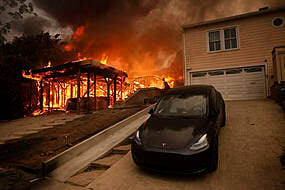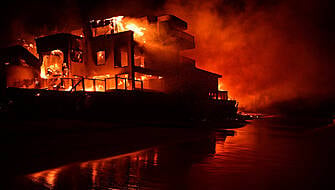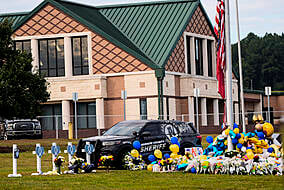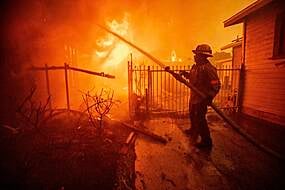Ousted Syrian President Bashar Assad fled to Moscow on Sunday, Russian media reported, hours after a stunning rebel advance took over the capital of Damascus and ended the Assad family’s 50 years of iron rule.
The Russian agencies, Tass and RIA, cited an unidentified Kremlin source on Mr Assad and his family being given asylum in Moscow, his long-time ally and protector.
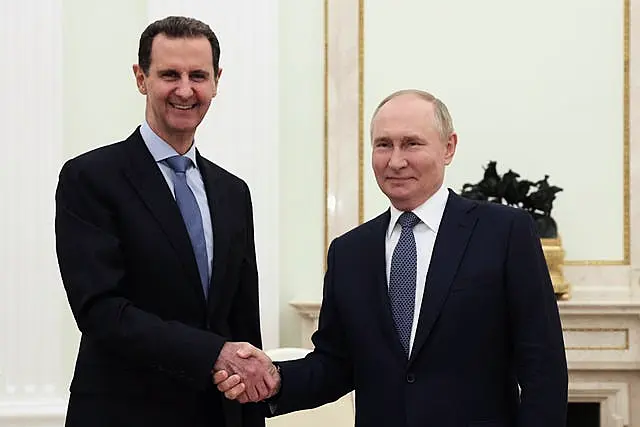
The Associated Press was not immediately able to verify the reports but contacted the Kremlin for comment.
RIA also said Moscow had received guarantees from Syrian insurgents of the security of Russian military bases and diplomatic posts in Syria.
Mr Assad reportedly left Syria early on Sunday, and Syrians have been pouring into streets echoing with celebratory gunfire after a stunning rebel advance reached the capital.
The swiftly moving events have raised questions about the future of the country and the wider region.
Russia has requested an emergency session of the UN Security Council to discuss the situation in Syria, Russia’s first deputy permanent representative to the UN, Dmitry Polyansky, posted on Telegram.
Joyful crowds gathered in central squares in Damascus, waving the Syrian revolutionary flag in scenes that recalled the early days of the Arab Spring uprising before a brutal crackdown and the rise of an insurgency plunged the country into a nearly 14-year civil war.
Others gleefully ransacked the presidential palace and the Assad family residence after President Bashar Assad and other top officials vanished, their whereabouts unknown.
Russia, a close ally, said Mr Assad left the country after negotiations with rebel groups and had given instructions to transfer power peacefully.
Abu Mohammed al-Golani, a former al-Qaeda commander who cut ties with the group years ago and says he embraces pluralism and religious tolerance, leads the biggest rebel faction and is poised to chart the country’s future direction.
In his first public appearance since fighters entered the Damascus suburbs on Saturday, Mr al-Golani visited the capital’s sprawling Umayyad Mosque and said Mr Assad’s fall was “a victory to the Islamic nation”.
Calling himself by his given name, Ahmad al-Sharaa, and not his nom de guerre, he told hundreds of people that Mr Assad had made Syria “a farm for Iran’s greed”.
The end of Mr Assad’s rule deals a major blow to Iran and its allies, already weakened by over a year of conflict with Israel.
Iran, which had strongly backed Mr Assad throughout the civil war, said Syrians should decide their country’s future “without destructive, coercive, foreign intervention”.
The rebels now face the daunting task of healing bitter divides in a country ravaged by war and still split among different armed factions.
Turkey-backed opposition fighters are battling US-allied Kurdish forces in the north, and the Islamic State group is still active in some remote areas.

Syrian state television aired a video statement early on Sunday by a group of rebels saying that Mr Assad had been overthrown and all prisoners had been set free. They called on people to preserve the institutions of “the free Syrian state”.
The rebels said they had freed people held at the notorious Saydnaya prison, where rights groups say thousands were tortured and killed.
A video circulating online purported to show rebels breaking open cell doors and freeing dozens of female prisoners, many of whom appeared shocked and confused. At least one small child could be seen among them.
Rebel commander Anas Salkhadi, who appeared on State TV later in the day, sought to reassure Syria’s religious and ethnic minorities, saying: “Syria is for everyone, no exceptions. Syria is for Druze, Sunnis, Alawites, and all sects.”
“We will not deal with people the way the Assad family did.”
Many of the capital’s residents were in disbelief at the speed at which Mr Assad lost his hold after nearly 14 years of civil war.

As daylight broke over Damascus, crowds gathered to pray in the city’s mosques and to celebrate in the squares, chanting “God is great”. People also chanted anti-Assad slogans and honked car horns.
“I cannot express my happiness,” said Bassam Masr. “But this happiness will not be completed until I can see my son out of prison and know where is he. I have been searching for him for two hours. He has been detained for 13 years.”
Syrian Prime Minister Mohammed Ghazi Jalali said in a video statement that the government was ready to “extend its hand” to the opposition and turn its functions over to a transitional government. A video shared on Syrian opposition media later showed a group of armed men escorting him out of his office and to the Four Seasons hotel.
Rami Abdurrahman of the Syrian Observatory for Human Rights told The Associated Press that Mr Assad took a flight on Sunday from Damascus.
A senior diplomat from the United Arab Emirates, which had sought to rehabilitate Mr Assad’s image and has welcomed high-profile exiles in recent years, declined to comment on his whereabouts when asked by reporters at a conference in Bahrain.
Anwar Gargash said Mr Assad’s destination at this point is a “footnote in history”, comparing it to the long exile of German Kaiser Wilhelm II after the First World War.
Mr Assad has been accused of war crimes and crimes against humanity during the war, including a 2013 chemical weapons attack on the outskirts of the capital.

